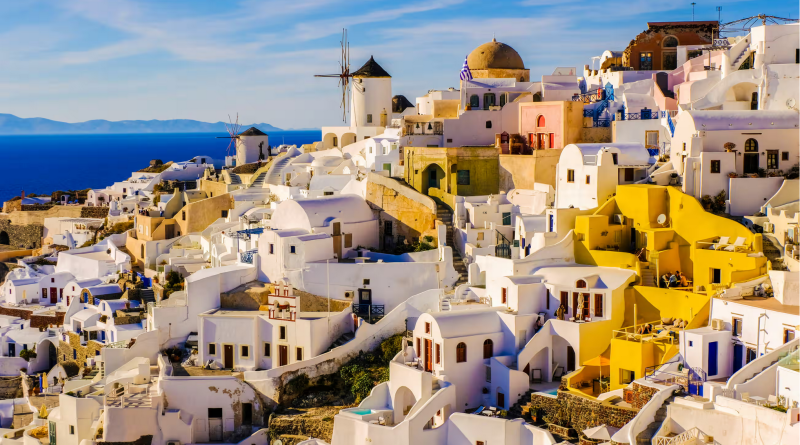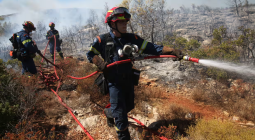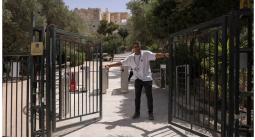‘Everywhere jam-packed’: mayor of Santorini warns of overtourism crisis

The Greek island of Santorini has more hotel beds per square metre than any other Greek tourist destination apart from Kos and Rhodes. Photograph: VW Pics/VWPics/Universal Images Group/Getty Images
Santorini, the island so Instagrammable it has become Greece’s most popular destination, will not be able to “save itself” if runaway development – the most tangible effect of overtourism – is not instantly curbed, the mayor has warned.
With more than 3.4 million tourists expected to visit the Cycladic hotspot this year, Nikos Zorzos called for urgent action to stop a construction spree that risks spurring the island’s ruination.
“We live in a place of barely 25,000 souls and we don’t need any more hotels or any more rented rooms,” he told the Guardian. “If you destroy the landscape, one as rich as ours, you destroy the very reason people come here in the first place.”
The building boom is directly related to the record numbers visiting an island that had already reached “saturation point” before the Covid pandemic, according to Zorzos, who is among the first local government officials in Greece to speak publicly about what he sees as the perils of overtourism.
Famous for its flaming sunsets and unique natural beauty, Santorini has an estimated 80,000 hotel beds, more per square metre than any other Greek tourist destination apart from Kos and Rhodes.
About a fifth of the southern Aegean island has already been concreted over. But to the consternation of ecologists, authorities in Athens approved even more building permits between 2018 and 2022, enabling construction on an additional 449,579 sq metres of terrain – about 2% of its 76 sq km (30 sq mile) total landmass.
Foreign-owned hotel chains and “strategic” tourism investors have led requests for the licences – many outside regulated zoned areas - that will include luxury lodgings slated to rake in thousands of euros per person per night, in expectation of well-off tourists from India and China in the years ahead.
By 2028 Greece hopes to attract almost 40 million tourists nationwide – 5.5 million more than this year and nearly four times its total population.
For Zorzos, an independent politician who taught ancient Greek before being elected mayor, the prospect of further development is as much of an existential threat as the climate emergency. Santorini may have moved fast to set up desalination plants, but after years of below-average rainfall in a country on the frontline of global heating he worries about the pressures placed on water resources and infrastructure.
“The environment is our home and destroying it we harm ourselves,” he said. “We should know from the past: no ancient civilisation that respected beauty ever declined.”
Voted into office for a third term this year, the 64-year-old has vivid memories of Santorini in another age when residents worked the island’s mines and earned a living from its famously arable volcanic soil by producing tomato pulp and wines.
The spectre of tourists arriving en masse to enjoy pricey cocktails and panoramic views of the island’s volcanic sea-filled crater would have been a distant dream barely decades ago. It wasn’t until 1974 that electricity first lit up local homes.
“Mass tourism really took off in the 1990s and that’s when you began to see change,” he said.
Santorini is not alone in facing challenges from its popularity. Other Aegean idylls, once deemed off the beaten track, have also come up against the unstoppable force of tourism.
But residents on popular isles have become more vocal. Last year rolling protests were staged against businesses occupying beaches with sunbeds and umbrellas and central government has increasingly been called to account.
Conservation groups have warned of islands being at a tipping point from which there may be no return if the development threatening their fragile eco systems is not reined in.
In a rare intervention last month, the Greek president, Katerina Sakellaropoulou, who takes a keen interest in the environment, highlighted the need to take a long-term view of the capacity of islands at the sharp end of tourism during talks with the prime minister, Kyriakos Mitsotakis. His pro-business, centre-right government has been accused of taking an overly lax approach to development.
The Cyclades is the Greek region most vulnerable to overtourism. Islands such as Santorini and Mykonos have become playgrounds for footballers and Hollywood stars, with Greeks often priced out, while the growing presence of gargantuan cruise ships decanting thousands of passengers has added to the strain.
This summer as many as 17,000 holidaymakers every day traversed through the narrow lanes of Fira, Santorini’s cliff-top town. “There have been times when the pressure is unbearable,” said Zorzos, speaking of occasions when five cruise ships have arrived at the same time. “Everywhere jam-packed with people who have no time to stop, no time to enjoy, who are actually full of angst, because they are so rushed.”
Greece is now one of the world’s top 10 destinations, with the tourism minister, Olga Kefalogianni, announcing that the country has set itself the goal of becoming a “global tourism power”.
But in a summer when the Cyclades have been associated as never before with the dangers of overtourism, the government appears to be taking note – at least around cruise ships. Mitsotakis has raised the possibility of limiting arrivals, saying Santorini and Mykonos are “clearly suffering”. Disembarkation fees have been mooted while steps are under way to cap the number of passengers going ashore to 8,000 – a “reasonable” berth allocation Zorzos has long pressed for.
“The cruise ship industry is key to our tourism, which is key to the Greek economy,” said a senior official preferring to speak anonymously. “But it’s clear this can’t continue. There’s a very strong feeling that the whole Santorini project has to be re-thought.”
Despite another frantic season, the mayor is still optimistic. “I may still feel like Sisyphus,” he said, referring to the mythological king condemned to pushing a boulder uphill only to see it roll back as he neared the top. “But attitudes have changed. Before, people thought I was wrong to be so critical. Now, they stop me in the street to say how right I was. We don’t want to become like Venice or Barcelona. We know it can’t go on like this.”






